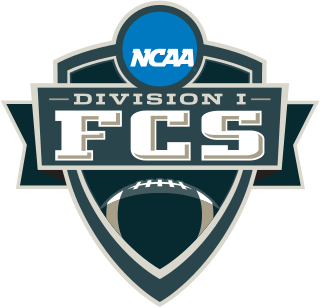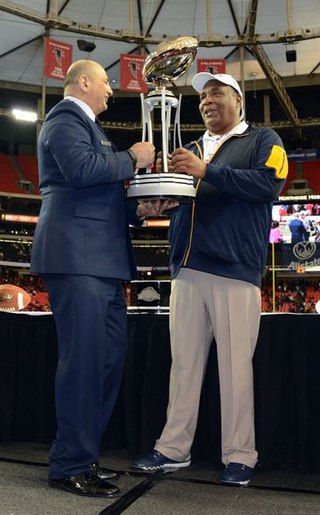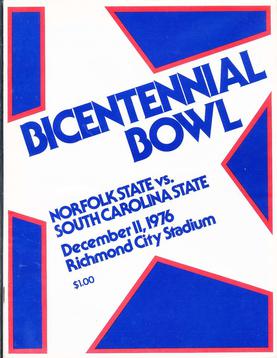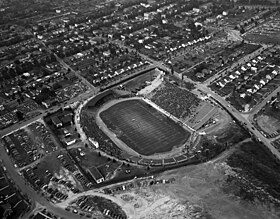
The Mid-Eastern Athletic Conference (MEAC) is a collegiate athletic conference whose full members are historically black colleges and universities (HBCUs) in the Southeastern and the Mid-Atlantic United States. It participates in the National Collegiate Athletic Association's (NCAA) Division I, and in football, in the Football Championship Subdivision (FCS).

The Central Intercollegiate Athletic Association (CIAA) is a college athletic conference affiliated with the National Collegiate Athletic Association (NCAA) at the Division II level, whose member institutions consist entirely of historically black colleges and universities (HBCUs).

The NCAA Division I Football Championship is an annual post-season college football game, played since 2006, used to determine a national champion of the NCAA Division I Football Championship Subdivision (FCS). From 1978 to 2005, the game was known as the NCAA Division I-AA Football Championship.
The Heritage Bowl was a NCAA Division I Football Championship Subdivision (FCS) bowl game held by the National Collegiate Athletic Association. The bowl pitted a team from the Mid-Eastern Athletic Conference (MEAC) against a team from the Southwestern Athletic Conference (SWAC). It was hoped that it would become a true national championship game for historically black colleges and universities (HBCUs). It was a successor to the Pelican Bowl, which matched MEAC and SWAC teams during the 1970s, and a predecessor to the Celebration Bowl of the 2010s.

The black college football national championship is a national championship honor that, since 1920, has been regularly bestowed upon the best football teams among historically black colleges and universities (HBCUs) within the United States.

The Florida A&M Rattlers football team represents Florida A&M University in the sport of American football. The Rattlers compete in the Football Championship Subdivision (FCS) of Division I of the National Collegiate Athletic Association (NCAA). Starting with the fall 2021 season, the Rattlers will compete in the East Division of the Southwestern Athletic Conference (SWAC), after a long tenure in the Mid-Eastern Athletic Conference (MEAC). They play their home games at Bragg Memorial Stadium in Tallahassee. The Rattlers have won 16 black college football national championship, 29 Southern Intercollegiate Athletic Conference (SIAC) titles, eight MEAC titles, one SWAC title and one I-AA national title in the history of their football program. During the 2004 season, the Rattlers briefly attempted to move up to Division I-A and become the only HBCU at college football's highest level, but the team was forced to abort its bid.

The North Carolina A&T Aggies football program represents North Carolina Agricultural and Technical State University in college football. The Aggies play in the NCAA Division I Football Championship Subdivision as a member of CAA Football, the technically separate football league operated by the Aggies' full-time home of the Coastal Athletic Association.

The North Carolina A&T Aggies are the athletic teams that represent North Carolina Agricultural and Technical State University in Greensboro, North Carolina, United States. The Aggies compete in NCAA Division I and are members of the Coastal Athletic Association (CAA) in all sports with the exception of football and women's bowling. North Carolina A&T fields varsity teams in 13 sports, five for men and eight for women. The football team competes in Division I Football Championship Subdivision (FCS), formerly known as Division I-AA, in the CAA's technically separate football arm of CAA Football.
Joe Taylor is an American college athletics administrator and former football coach. He is the athletic director at Virginia Union University in Richmond, Virginia, a position he has held since 2013. Taylor served as the head football coach at Howard University in 1983, Virginia Union from 1984 to 1991, Hampton University from 1992 to 2007, and Florida A&M University from 2008 to 2012, compiling a career college football coaching record of 232–96–4. Taylor led the Hampton Pirates to five black college football national championships and eight conference titles. He was inducted into the College Football Hall of Fame in 2019.

The Mid-Eastern Athletic Conference Men's Basketball Player of the Year is an annual award given to the Mid-Eastern Athletic Conference's (MEAC) most outstanding player. The award was first given following the 1971–72 season. There has never been a tie for co-player of the year in the award's history, nor has there been a national player of the year. Two players have been named the MEAC Player of the Year three times: Marvin Webster of Morgan State (1973–75) and Joe Binion of North Carolina A&T (1982–84). The school with the most all-time honorees is North Carolina A&T, now a member of the Big South Conference, which has had nine winners, but its last award before its 2021 departure was in 1988. Among current members, Coppin State has the most recipients with eight. The only current member of the MEAC without a winner is Maryland Eastern Shore.
The Pelican Bowl is a defunct, Louisiana-based NCAA Division II bowl game that was intended to match the overall champions or top-seeded co-champions from the then-new Mid-Eastern Athletic Conference (MEAC) and the long-established Southwestern Athletic Conference (SWAC) to determine the black college football national championship in the United States between 1972 and 1975. The game was won by the SWAC opponent in all three editions of the bowl. Due to low attendance, the game folded following the 1975 contest; the concept would be revived from 1991 to 1999 with the Heritage Bowl and again in 2015 with the Celebration Bowl.

The MEAC/SWAC Challenge is an annual historically black college (HBCU) football game showcasing a team from each of the two NCAA Division I conferences made up entirely of HBCUs—the Mid-Eastern Athletic Conference (MEAC) and Southwestern Athletic Conference (SWAC). The series began in 2005 and initially paired the defending conference champions, although the selection process was broadened in 2007 to include non-champions as well. Following the 2022 game, the MEAC leads the series with 10 wins to the SWAC's five. The Challenge is televised nationally on ESPN and is owned by ESPN Events. It was historically associated with the Labor Day weekend, but starting in 2021 has instead taken place a week earlier during college football's Week 0.

The Celebration Bowl is a postseason college football bowl game, first played in the 2015 season, contested between the champions of the Mid-Eastern Athletic Conference (MEAC) and the Southwestern Athletic Conference (SWAC)—the two prominent conferences of historically black colleges and universities (HBCUs) in NCAA Division I. It serves as the de facto national championship of black college football. The game is held annually in Atlanta on the third weekend of December, and has been played at the Georgia Dome and Mercedes-Benz Stadium. It is currently the only active bowl game to feature teams from the Football Championship Subdivision (FCS).

The Bicentennial Bowl was a postseason college football bowl game played after the 1975 and 1976 regular seasons. Each game was held at a different venue; the first game in Little Rock, Arkansas, and the second game in Richmond, Virginia. The bowl's name came from the United States Bicentennial. Results are listed in NCAA records, but the games were not considered NCAA-sanctioned bowls.
The 1976 South Carolina State Bulldogs football team represented South Carolina State University as a member of the Mid-Eastern Athletic Conference (MEAC) during the 1976 NCAA Division II football season. In its fourth season under head coach Willie Jeffries, the team compiled a 10–1 record, tied for the MEAC championship, defeated Norfolk State in the Bicentennial Bowl, and outscored opponents by a total of 278 to 44. The team was recognized as the 1976 black college football national champion and was ranked No. 8 by the Associated Press in the final 1976 NCAA Division II football rankings.

The 2022 HBCU Legacy Bowl was a post-season college football all-star game played on February 19, 2022, at Yulman Stadium in New Orleans, Louisiana. It was the inaugural edition of the HBCU Legacy Bowl, whose founding was announced by the Black College Football Hall of Fame on March 18, 2021. The game was the last of the all-star games that concluded the 2021–22 bowl games. Television coverage was provided by NFL Network.
The 2021 Celebration Bowl was a college football bowl game played on December 18, 2021, with kickoff at 12:00 p.m. EST at Mercedes-Benz Stadium in Atlanta, with television coverage on ABC. It was one of the highest attended and sixth edition of the Celebration Bowl, and was the only one of the 2021–22 bowl games to feature FCS teams. Sponsored by wireless service provider Cricket Wireless, the game was officially known as the Cricket Celebration Bowl.

NCAA Division II bowl games are American college football bowl games played annually among some of the highest-ranking NCAA Division II football teams not invited to participate in the NCAA Division II Football Championship playoffs. The games are officially recognized by the NCAA. They are held in December, and are most commonly scheduled on the first Saturday of the month, three weeks after the final games of the Division II football regular season.
The 1981 Virginia Union Panthers football team represented Virginia Union University as a member of the Central Intercollegiate Athletic Association (CIAA) during the 1981 NCAA Division II football season. Led by 11th-year head coach Willard Bailey, the Panthers compiled an overall record of 11–1 and a mark of 7–0 in conference play, and finished as CIAA champion after they defeated North Carolina Central in the first CIAA Championship Game. Virginia Union finished their season with a loss against Shippensburg State in the Division II playoffs. At the conclusion of the season, the Panthers were also recognized as black college national champion.

The Pioneer Bowl was an annual American NCAA Division II college football bowl game contested between NCAA Division II teams from the Central Intercollegiate Athletic Association (CIAA) and Southern Intercollegiate Athletic Conference (SIAC), two athletic conferences traditionally consisting of historically black colleges and universities (HBCUs). Between 1997 and 2012, the game was played 14 times in five different cities in the South.













